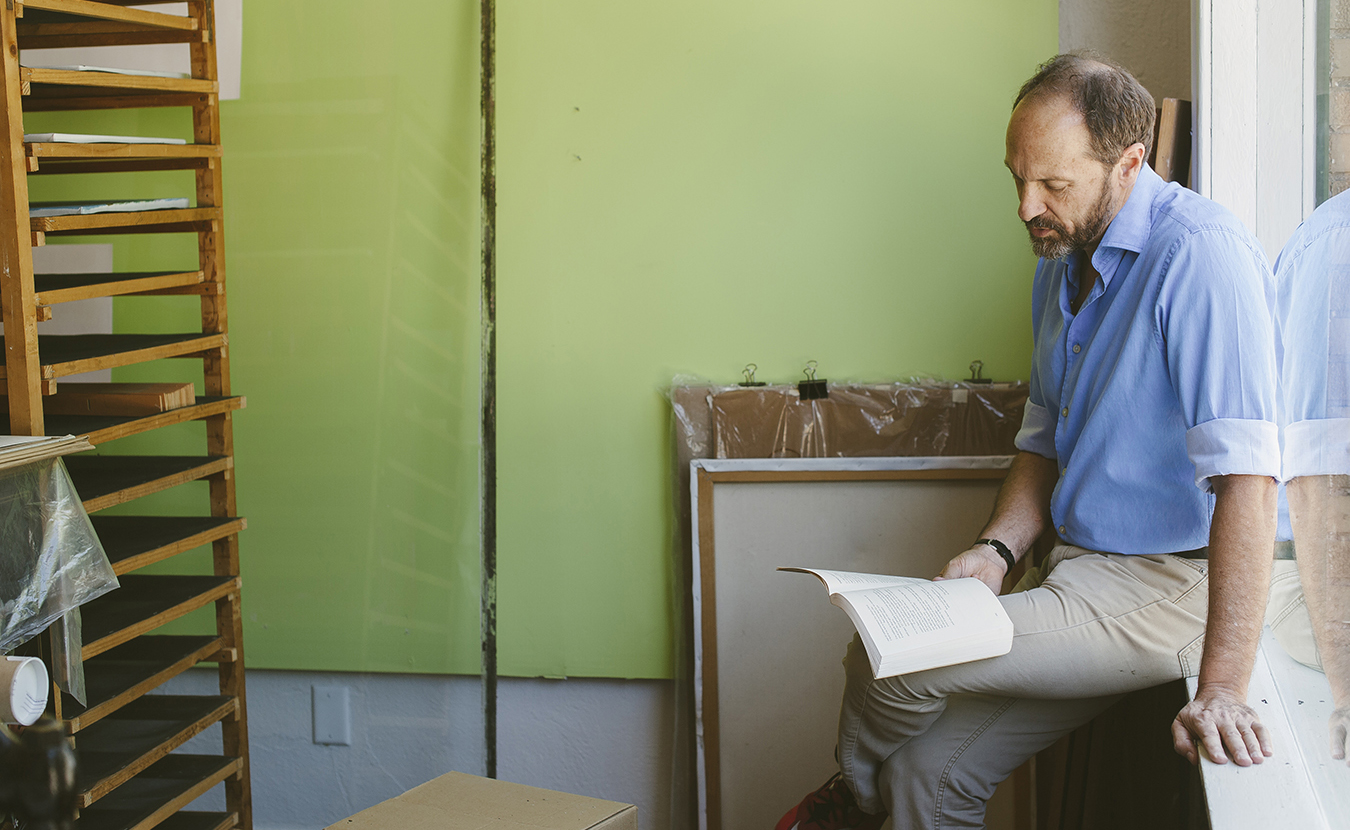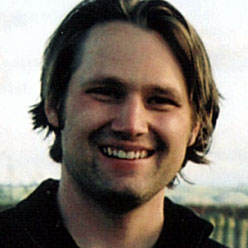Bloomington’s poetry scene is developing in new places and media thanks, in part, to the work of David Torneo and Ledge Mule Press.
The 57-year-old Torneo is a California and New York transplant who recently gave up a lengthy and successful career as a youth therapist to devote himself to the written word by co-founding Ledge Mule Press along with fellow wordsmiths Ross Gay and Chris Mattingly.
Ledge Mule Press produces intricate, bespoke, limited-run (usually 200 copies) poetry books and on September 19 is set to launch a 7-inch vinyl record featuring spoken-word performances by Matt Hart and Rachel McKibbens (Hart and Wendy Lee Spacek will read at the launch; see below for event details). Torneo and company also facilitate the Ledge Mule Press Poetry Project, an ongoing series of public poetry readings, book launches, and musical performances at the I Fell Gallery on West 4th Street.
A Bloomington resident since 1996, Torneo was born in Los Angeles and graduated from the University of California at Santa Barbara in 1980. He spent some time in upstate New York before arriving in Bloomington, and it’s here, in the heart of the Midwest, that his lifelong love of poetry — and prose; he’s writing a play — has been allowed to flourish.

Torneo emphasizes that Ledge Mule Press is first and foremost about the poet being featured — and allowing their voice to be heard not only via their writing but throughout the production process, such as Romayne Rubina’s “Then Gone” (pictured here). | Photo by Natasha Komoda
Pressed to name his favorite poet and poem, Torneo cites Yusef Komunyakaa’s “Blue Light Lounge Sutra for the Performance Poets at Harold Park Hotel.” Komunyakaa taught at Indiana University Bloomington from 1985 to 1997 and is now a creative writing professor at New York University.
“That’s my favorite today,” Torneo says. “Who knows what tomorrow will bring? Philip Levine also wrote a poem that I really love. It’s called ‘My Son and I.’ It’s really beautiful.”
When you ask him about his own work, though, Torneo politely demurs. He’d much rather talk about what other local poets are doing. He says he enrolled in his first poetry workshop while in his early 20s, when he was an undergrad at UC Santa Barbara. In the intervening years, he says he had about twenty pieces published in “little journals and reviews,” such as Mudfish, The Café Review, Silverfish Review, Another Chicago Magazine, Asylum, and Big Scream. In addition to Levine and Komunyakaa, he says the poets Gerald Stern, W.S. Merwin, and Denise Levertov had the most influence on him when he first started writing. “Those were the poets of the time, the poets I really loved — and still do.”
What Torneo will say about his writing is that much of it concerns family and familial relationships — particularly among men. He’s writing a play exploring those themes, which he hopes to see performed at the I Fell Gallery.
“The play is new territory for me,” he says. “It began as a poem about a dialog between a father and a son. I have two adult sons whom I’m very close to. I’m close to my father as well. It’s like a melding of those relationships. The play, and some of my more recent poems, were about those relationships. The play is about a difficult father-son relationship and … generational gaps and different conflicts and how those are worked out between a father and a son, or not worked out, sometimes left dormant, and then they fester and there’s this resentment that can happen.
“The characters in the play are a father and a son,” he explains. “The third character is the son as an older man who’s observing the relationship that went on between him and his father thirty years before.”
Torneo uses familial terms like “support system” to describe his relationship with Gay and Mattingly, the co-founders of Ledge Mule Press. They “are truly an inspiration to me in many ways: their poetry, the poetry they’ve introduced me to, and their knowledge regarding the books we make, their editing, their sensibilities, taste, and guidance, and most of all their friendship.”
Torneo became acquainted with Gay and Mattingly via a poetry writing group that met weekly at a coffee shop in Bloomington. Gay teaches at IU Bloomington and has published several books of poetry, including Bringing the Shovel Down (2011) and Catalog of Unabashed Gratitude (2014). He also co-founded the web-based sports magazine Some Call It Ballin’. Mattingly, who graduated from IU Bloomington with a degree in English and folklore, is the author of Scuffletown, a full-length collection of poems. [Editor’s note: Gay is in Connecticut for this school year as a fellow in the Radcliffe Institute for Academic Study at Harvard University.]
The trio discussed many ideas for growing and nurturing the city’s poetry scene. “One of them that actually came to fruition was Ledge Mule Press,” Torneo says. It prints poetry books using woodblock and letterpress print and other handmade techniques. Torneo, Gay, and Mattingly choose an author to feature, edit the poems, and design the book before handing it over to Robert Ronk at Hound Dog Press in Louisville, Kentucky, who handles the intricate production work. Ledge Mule’s first book, called Hollow & Round, featured the work of IU Bloomington MFA student David Watters; the second, Then Gone, is a showcase for the poems of Romayne Rubinas, who teaches at IU in the MFA program.

Torneo says Ledge Mule Press co-founders Chris Mattingly and Ross Gay “are truly an inspiration to me in many ways: their poetry, the poetry they’ve introduced me to, and their knowledge regarding the books we make, their editing, their sensibilities, taste, and guidance, and most of all their friendship.” | Photos by Natasha Komoda
“They’re pieces of art, really,” Torneo says. “But what Chris Mattingly always says is the press is an expression of our friendship. We want to print really good poetry, and we want to do letterpress and woodblock prints and make these limited-edition poetry books. It’s also a way for us to share this desire to keep poetry going in our lives and also to put other poets in print — local, regional poets.”
Torneo emphasizes that Ledge Mule Press is first and foremost about the poet being featured — and allowing their voice to be heard not only via their writing but throughout the production process.
“For our last book with Romayne, she drove down to Louisville with us and we met with Robert Ronk at Hound Dog Press, and we talked about everything with her,” he says. “What order the poems were going to be in, what kind of paper, the woodblock image, how the poems would look on the page, the color of the ink, everything. It’s so crucial to get their input. With major mass-produced poetry books, I don’t think poets have as much say in what they do. It should be a collaborative, creative event. I think that is really essential. We try to do that. That’s how we try to be different.”

Ledge Mule’s first book, “Hollow & Round,” features the work of IU Bloomington MFA student David Watters. | Photo by David Watters
In addition to publishing its own titles, Ledge Mule Press helps promote the work of Bloomington-connected poets published by other imprints. In July, Ledge Mule Press hosted a book launch at I Fell Gallery for Leslie Marie Aguilar’s debut, titled Mesquite Manual and published by New Delta Review. Aguilar, an IU MFA graduate, is the Indiana Review’s poetry editor and the recipient of numerous awards and fellowships, including the National Society of Arts and Letters Literature Award. He also invited Bloomington-based poets Britt Ashley and Danni Quintos, along with local band Corn Palace, to perform at the book launch. Torneo went one step further by interviewing Aguilar for a podcast, available on soundcloud.com and embedded below. In February, Ledge Mule held a book launch for Gay’s latest effort, Catalog of Unabashed Gratitude; the event featured Busman’s Holiday as the musical guest.
Producing limited amounts of old media, such as chapbooks and vinyl records, while utilizing the mass effect of 21st-century outlets like podcasts, is all part of the plan, according to Torneo. He says Ledge Mule Press and its Poetry Project are attempting to fill a void — or perhaps bridge a gap, depending on how you look at it — in Bloomington’s literary and music scenes.
“There are different writers guilds and little groups like that in town, but I felt like, wow, we have this gallery space and so much potential to bring in poets and music, too, at the same time. You could have a band play and then the poets read and the band comes on and plays a couple more songs. This is the kind of thing we’re looking at and what we’ve done. We want to continue to do it. It’s a great way to bring people together and share the arts — give people venues to share their own work. That’s the goal.”
Event Information
The release party for Ledge Mule Press’ 7-inch record takes place September 19 at 8 p.m. at I Fell Gallery, 415 W. 4th St. Matt Hart and Wendy Lee Spacek will read their poetry; Bloomington punk band Thee Tsunamis will also perform. For more information and updates, follow Ledge Mule Press on Facebook.
Editor’s Note
Torneo’s interview with Leslie Marie Aguilar, poetry editor of Indiana Review, is embedded below. Keep checking with Limestone Post for his two-part podcast with Ledge Mule Press co-founder Chris Mattingly, who talks about growing up in a famous baseball family (his uncle is Los Angeles Dodgers manager Don Mattingly), his escape into punkdom, and his awakening as a poet. Click here to read our story on Ledge Mule Press co-founder Ross Gay becoming a Finalist in the National Book Foundation’s National Book Awards.
Monster Influence
Dave Torneo cites another Bloomington-based indie publisher — Monster House Press, and its editor, Richard Wehrenberg — as an inspiration for Ledge Mule Press. “They publish some really, really excellent poets,” he says, mentioning Michelle Gottschlich and Wendy Lee Spacek as examples.
Gottschlich is a Bloomington-based poet whose debut, Void Sets, was published in May; Spacek, whose forthcoming collection is called Psychogynecology, is slated to appear at the September 19 launch of Ledge Mule’s 7-inch record. “She writes about really amazing, daring stuff … sexuality and trauma,” Torneo says. “The trauma of sexual assault and things like that. I think she’s great.”
Torneo doesn’t consider Monster House a competitor — quite the opposite, in fact. “I think small presses should stick together,” he says.
—Brian Hartz



